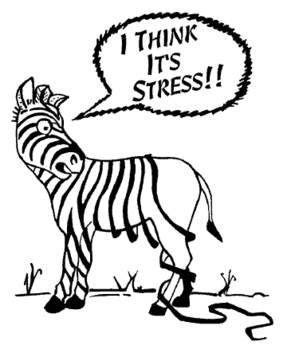Stress, Humor & the Workplace
 Countless health research studies and documented medical cases show the negative effects of stress on health and wellbeing. Stressful situations in our workplaces are unavoidable. If we cannot control or stop the causes of stress, we can find positive, constructive methods to maintain our health and wellbeing. Humor relieves stress and helps us be positive, productive and effective.
Countless health research studies and documented medical cases show the negative effects of stress on health and wellbeing. Stressful situations in our workplaces are unavoidable. If we cannot control or stop the causes of stress, we can find positive, constructive methods to maintain our health and wellbeing. Humor relieves stress and helps us be positive, productive and effective.
Join this workshop to learn how humor can reduce stress and create a more positive work environment!
Negative Health Effects of Stress
Stress is caused by any event or occurrence (ongoing or isolated) that threatens an individual's coping strategies or resources.
Common physical manifestations of stress: 
- disrupted sleep
- indigestion, stomach ache
- chest pains, high blood pressure
- fatigue
- back or neck pain, headaches
.
Common psychological manifestations of stress:
- anxiety
- frustration
- irritability
- depression
- burnout

Positive Benefits of Laughter and Humor
A good "sense" of humor and laughter can trigger both short and long-term health benefits, increasing overall wellbeing. 
“With the fearful strain that is on me night and day,
if I did not laugh, I should die.” ~ Abraham Lincoln, 1865
Immediate Benefits of Humor and Laughter:
- Increases respiration, heart rate, muscular activity
- Triggers increased oxygenation & circulation
- Releases endorphins in the brain
- Eases tension, makes one feel more "relaxed"

Long-Term Benefits of Humor and Laughter
- Boosts immune system--positive thoughts release neuropeptides (fight stress)
- Relieves pain--reduces tension, prevents muscle spasms, releases body's natural pain killers
- Improves mood--hard to "dwell in darkness" when you're smiling and laughing!
- Strengthens your relationships with others--people are attracted to happy, fun, positive people
"Laugh, and the world laughs with you; weep, and you weep alone." ~Ella Wheeler Wilcox
Remember to "Lighten Up"

- Mixing humor into the workplace is a social skill.
- Consider timing, audience, and intent. Be prepared to follow-up whether you "fly" or "fail"
- Never use humor to gain power, bully, or tear-down
- People appreciate positive, "bonding" humor over aggressive humor
- Humor should bring people together or smooth the way during disagreement
- Constructive criticism is delivered better with a smile than a frown
- Don't take yourself too seriously....humor can keep you afloat!
- Collaboration and cooperation are strengthened by shared humor and laughter
Recommended Reading
The best medicine?. (2015). Mayo Clinic Health Letter, 33(7), 7. Retrieved from Academic Search Complete database.
Cann, A., & Kuiper, N. A. (2014). Research on the role of humor in well-being and health. Europe's Journal Of Psychology, 10(3), 412-428. doi:10.5964/ejop.v10i3.818
Frey, R. J., & Davidson, T. (2015). Stress. In J. L. Longe (Ed.), Gale encyclopedia of medicine (5th ed., Vol. 7, pp. 4822-4825). Retrieved from GVRL Database.
Hartwell-Walker, M. (2016). Laughter Is Serious Business!. Psych Central. Retrieved on February 6, 2018, from https://psychcentral.com/lib/laughter-is-serious-business/
Romero, E.J., & Cruthirds, K.W. (2006). The use of humor in the workplace. The Academy of Management Perspectives 20(2), 58-69. retrieved from http://www.emotionsnet.org/wp-content/uploads/2011/04/RomeroCruthirds2006.pdf
Shellenbarger, S. (2013, August 14). Comedic gold or clunker? Secrets of effective office humor. Wall Street Journal. Retrieved from Proquest database.
Stress relief from laughter? It's no joke. (2013, July 13). Mayo Clinic. Retrieved September 13, 2015, from http://www.mayoclinic.org/healthy-lifestyle/stress-management/in-depth/stress-relief/art-20044456
Thompson, K. (2013). Funny Business at Work. Phi Kappa Phi Forum, 93(3), 25. Retrieved from Academic Search Complete database.